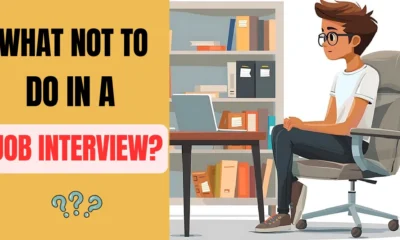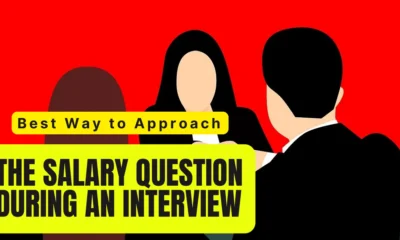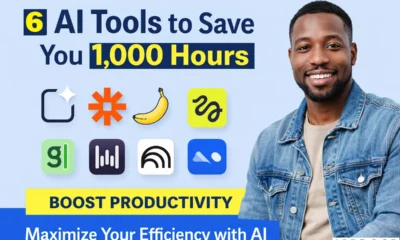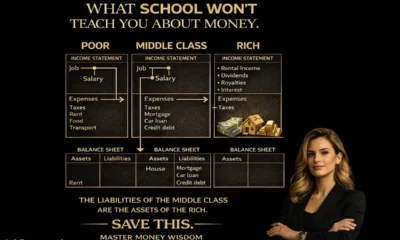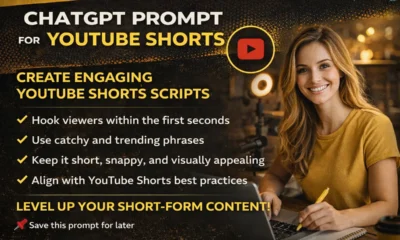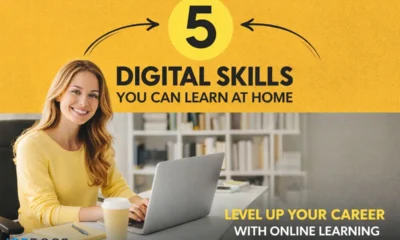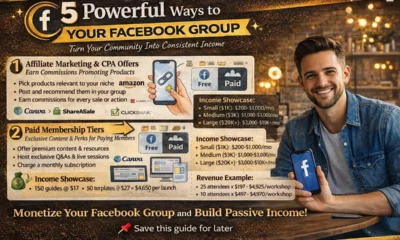Career
🚫 These Job Interview Mistakes Are Costing People Their Jobs (And How to Avoid Them)

Job interviews can feel scary, especially if you’re preparing for your very first one. Sweaty palms, racing thoughts, and that overwhelming question — “What if I say the wrong thing?” You’re not alone. Almost everyone feels nervous before an interview. The good news? With the right preparation, you can avoid common job interview mistakes and walk in feeling confident.
This guide will show you the worst mistakes people make in job interviews — and more importantly, how you can avoid them. Think of it as advice from a friendly mentor who wants to see you succeed. By the end, you’ll know how to prepare, what to say, what not to say, and how to leave a positive impression that lasts.
Why Avoiding Interview Mistakes Matters?
Before we jump into the list, let’s get one thing clear: a job interview is not your entire future. It’s just one step towards it. That step can open doors, but even if you stumble, it’s not the end of the road.
That said, first impressions count. Studies show that interviewers often form an opinion about candidates within the first 7 minutes of an interview. Small mistakes — like showing up late, speaking negatively, or looking unprepared — can cost you an opportunity.
But here’s the encouraging part: most mistakes are easy to avoid once you know what they are.
The 12 Worst Job Interview Mistakes (and How to Avoid Them):
1. Arriving Late (or Too Early):
Nothing creates a bad first impression faster than showing up late. It signals poor time management and lack of respect for the interviewer’s schedule. On the flip side, arriving too early (like 30 minutes) can make things awkward.
Tip: Aim to arrive 10-15 minutes early. If it’s a remote interview, log in a few minutes ahead to check your internet, camera, and microphone.
2. Not Researching the Company:
Imagine being asked, “So, what do you know about us?” and having no answer. Ouch. Not knowing basic facts about the company shows you’re not serious.
Tip: Spend 20 minutes researching:
- What the company does
- Their values or mission
- Recent news or projects
- The role you’re applying for
This not only prepares you for questions but also shows genuine interest.
For deeper insights into early career strategies, see [How to Never Be Jobless Again: 6 Proven Strategies for UK Job Seekers in 2025].
3. Dressing Inappropriately:
Your outfit sends a message before you even speak. Dressing too casually can look unprofessional, while overdressing might make you seem out of place.
Tip: Research the company’s dress code. If unsure, choose smart casual or business casual. For example, a clean shirt, trousers or skirt, and neat shoes work in most settings.
4. Poor Body Language:
Slouching, avoiding eye contact, or fidgeting tells the interviewer you’re nervous or disinterested. Body language is a silent but powerful communicator.
Tip:
- Sit upright
- Make natural eye contact
- Offer a firm handshake (if in person)
- Smile when appropriate
These small signals build confidence and trust.
5. Talking Too Much (or Too Little):
Some candidates ramble endlessly, while others give one-word answers. Both extremes hurt your chances.
Tip: Use the STAR method (Situation, Task, Action, Result) to structure answers. It keeps your response clear and focused. For example:
Q: “Tell me about a time you solved a problem.”
A: “At university, our group project faced delays (Situation). As team lead, I created a task calendar (Task). I divided roles and checked progress weekly (Action). We finished ahead of time and got top marks (Result).”
6. Speaking Negatively About Past Employers:
Badmouthing your old boss or company is a red flag. It makes interviewers wonder if you’ll talk the same way about them.
Tip: Stay positive. If asked why you left a job, focus on growth:
“I learned a lot at my last role, but I’m ready for new challenges and opportunities to grow.”
7. Not Asking Questions:
When the interviewer says, “Do you have any questions?” and you reply with “No,” it signals disinterest.
Tip: Prepare 2–3 questions like:
- “What does a typical day in this role look like?”
- “How do you measure success in this position?”
- “What are the opportunities for growth here?”
This shows curiosity and enthusiasm.
Also read this useful post What NOT to do in a Job Interview as a Candidate?
8. Forgetting to Highlight Achievements:
Some people just list duties from past jobs or school projects. Interviewers want to know what you achieved, not just what you did.
Tip: Share numbers and results. For example:
- “I improved customer response time by 30%.”
- “I led a student team that won a regional competition.”
9. Not Preparing for Common Questions:
Classic questions like “Tell me about yourself” or “What are your strengths and weaknesses?” often catch people off guard.
Tip: Practice short, confident answers. For weaknesses, choose something real but show improvement:
“I used to struggle with time management, but I now use planning tools to stay organized.”
10. Overusing Buzzwords or Clichés:
Phrases like “I’m a perfectionist” or “I work too hard” sound fake because interviewers hear them all the time.
Tip: Be genuine. Replace clichés with real examples. Instead of saying “I’m a team player,” share a story of how you helped your team succeed.
11. Ignoring the Basics in Remote Interviews:
Many interviews today happen online. A noisy background, poor internet, or unprofessional setting can ruin your impression.
Tip:
- Test your internet and camera
- Choose a quiet, well-lit space
- Dress as you would for an in-person interview
- Keep eye level with the camera
12. Forgetting to Follow Up:
The interview doesn’t end when you walk out or log off. Many candidates miss the chance to make a lasting impression by not sending a thank-you note.
Tip: Send a polite thank-you email within 24 hours. Keep it short:
“Thank you for the opportunity to interview today. I enjoyed learning more about the role and your company. I’m excited about the chance to contribute.”
Quick Checklist: Interview Mistakes to Avoid
Here’s a simple recap of what not to do:
- Don’t be late or unprepared
- Don’t dress inappropriately
- Don’t slouch, mumble, or avoid eye contact
- Don’t talk too much or too little
- Don’t complain about past jobs
- Don’t forget to ask questions
- Don’t leave without following up
Extra Job Interview Tips for Beginners:
If it’s your very first interview, here are a few more tips to boost confidence:
- Practice with a friend — Do a mock interview and get feedback.
- Bring essentials — Copy of your CV, a notebook, and a pen.
- Breathe — A deep breath before answering helps calm nerves.
- See it as practice — Even if you don’t get the job, every interview is a step forward.
Conclusion:
Interviews don’t have to feel like a battle. By avoiding these common job interview mistakes, you’ll already be ahead of many other candidates. Remember, the goal isn’t to be perfect — it’s to show the best version of yourself.
Every interview is a chance to learn, grow, and improve. Walk in prepared, stay calm, and leave knowing you gave it your best shot. Your dream job may be just one conversation away.
Take the first step today: review these mistakes, practice your answers, and get ready to shine in your next interview. You’ve got this!
Career
5 Underrated Digital Skills You Can Learn at Home That Most People Still Ignore
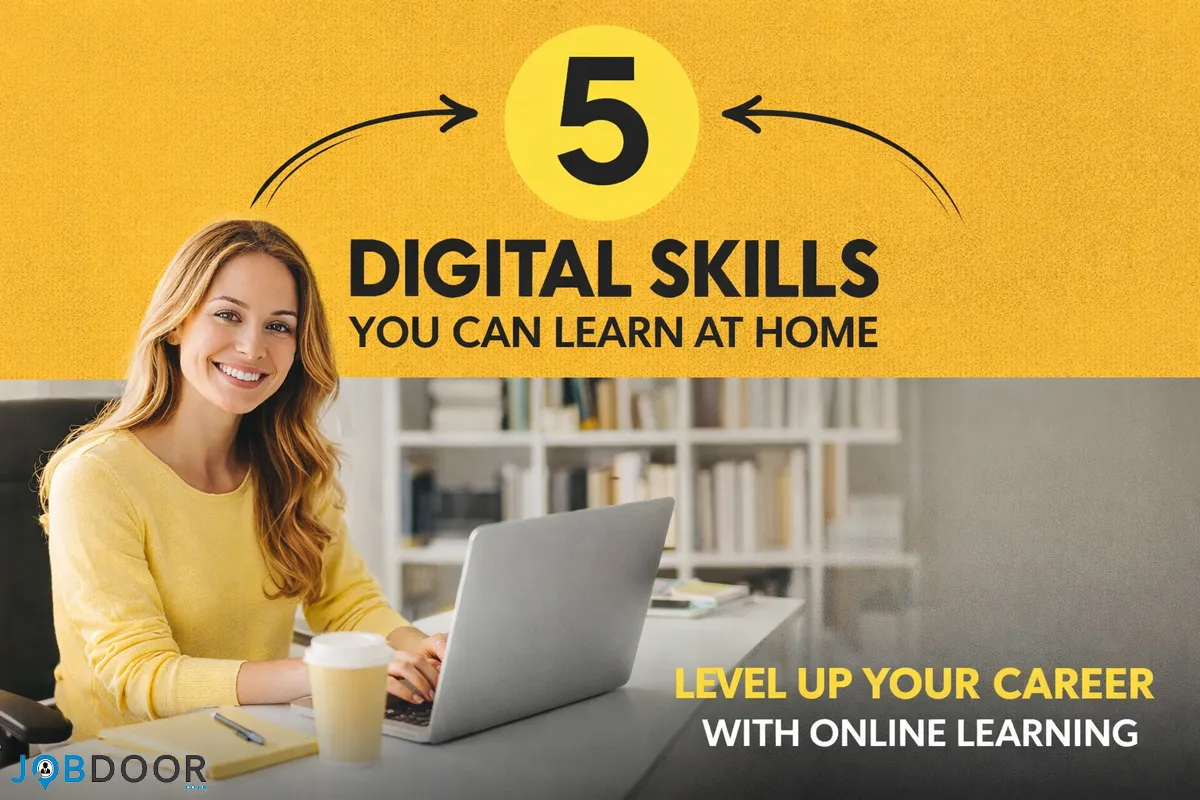
If you’ve read even a few career blogs, you’ve seen the same advice again and again.
Learn content writing.
Learn graphic design.
Learn digital marketing.
And at some point, you think:
“Okay… but everyone already knows this. What now?”
That feeling is valid.
The internet keeps recycling the same beginner skills, while quietly ignoring newer, less crowded opportunities. Skills that don’t look flashy on Instagram—but actually create leverage.
This article is for people who:
- Are tired of generic advice
- Want skills with less competition
- Prefer quiet, long-term value over hype
- Want control, not constant hustle
In this guide, you’ll learn 5 overlooked digital skills you can learn at home, why they matter, who they’re for, and how to start without overwhelm.
No buzzwords. No trend-chasing. Just practical direction.
Why “Popular Skills” Are Becoming Harder to Monetize?
Let’s be honest for a moment.
Popular skills aren’t useless—but they are crowded.
When everyone learns the same thing:
- Prices drop
- Competition rises
- Anxiety increases
That’s why the smarter move today is not popular skills, but supporting, system-level skills.
Skills that:
- Sit behind the scenes
- Are hard to replace
- Are learned by fewer people
That’s where stability lives.
1. No-Code Automation (Making Tools Talk to Each Other):
What This Skill Really Is?
No-code automation means connecting apps so work happens automatically, without writing code.
Example:
- When someone fills a form → data goes to a spreadsheet → email is sent automatically.
Tools do the work. You design the flow.
Why This Skill Is Powerful (and Ignored)?
Most people:
- Hate repetitive tasks
- Don’t know automation exists
- Think it requires programming
It doesn’t.
Businesses lose hours daily on manual work. Automation fixes that quietly.
Tools You’d Learn:
- Zapier
- Make (formerly Integromat)
- Airtable
Who This Skill Is Perfect For?
- Organized thinkers
- Process lovers
- People who enjoy efficiency
This skill pays well because it saves time, not because it looks creative.
2. Data Cleanup & Organization (The Skill Nobody Wants—but Everyone Needs):
What It Is?
This skill involves:
- Cleaning messy spreadsheets
- Organizing data
- Removing duplicates
- Making information usable
Not analysis. Not coding. Just clarity.
Why This Skill Is Underrated?
Data is everywhere.
Clean data is rare.
Most businesses have information—but it’s unusable. They need someone who can bring order.
Why Beginners Can Learn This Easily?
- Learn Google Sheets or Excel basics
- Practice sorting, filtering, formatting
- Build patience and precision
It’s calm work. Focused work.
And surprisingly valuable.
3. AI Prompt Design (Talking to AI the Right Way):
What This Skill Actually Is
AI prompt design means knowing how to ask AI tools the right questions to get high-quality results.
Most people type vague prompts and get poor outputs.
A prompt designer:
- Structures instructions clearly
- Adds context
- Guides outcomes
Why This Is a New Opportunity?
AI tools are everywhere now.
But most people use them badly.
Those who know how to guide AI properly save:
- Time
- Money
- Effort
This skill is about thinking clearly, not being technical.
Who This Is For?
- Writers
- Managers
- Researchers
- Anyone working with AI tools daily
It’s a thinking skill. And thinking skills age well.
4. Digital Product Operations (Running the Backend Nobody Sees):
What This Skill Means?
Digital product operations involves managing:
- Product uploads
- File organization
- Customer access
- Updates and versions
It’s the engine room behind online products.
Why This Skill Is Rare?
Everyone wants to:
- Create
- Sell
- Promote
Very few want to maintain systems.
But creators desperately need help keeping things running smoothly.
What You’d Learn?
- File management
- Platform dashboards
- Version control (simple, not technical)
- Customer access workflows
This skill brings stability and long-term work.
5. Knowledge Management (Turning Information Into Systems):
What Is Knowledge Management?
It’s the skill of:
- Organizing notes
- Structuring information
- Building personal or team knowledge systems
Think:
- Notion dashboards
- Documentation systems
- Learning libraries
Why This Skill Is Becoming Valuable?
Information overload is real.
People don’t lack information.
They lack structure.
Those who can turn chaos into clarity are quietly in demand.
Who This Is Perfect For?
- Deep thinkers
- Note-takers
- People who love systems
It’s not loud work. But it’s respected work.
How to Choose the Right “Unpopular” Skill for You?
Ask yourself:
- Do I enjoy structure or creativity?
- Do I prefer solving problems quietly?
- Do I like improving systems?
Choose the skill that feels mentally calm, not exciting.
Calm skills are sustainable skills.
A Simple Learning System:
Use this 3–2–1 system:
- 3 days a week: learning
- 2 days a week: practice
- 1 day a week: review
Track:
- What confused you
- What clicked
- What improved
This reduces anxiety and builds confidence naturally.
Why These Skills Give You an Advantage?
These skills:
- Have less competition
- Are harder to replace
- Support other roles
- Age well over time
They don’t depend on trends.
They depend on thinking and structure.
Conclusion:
The internet rewards noise.
The real world rewards reliability.
You don’t need another popular skill.
You need one overlooked skill you can grow steadily.
Pick one from this list.
Learn it slowly.
Apply it calmly.
That’s how real careers are built—without panic.
👉 Choose the skill that feels boring but useful. Start today.
Career
9 Free AI Courses with Certificates in 2026 (Step-by-Step Guide)
“AI Sounds Important… But Is It Really for Me?”
Let’s be honest.
When you hear Artificial Intelligence, what comes to mind?
Complex math? Coding? Long hours? Expensive courses?
You’re not wrong to feel confused or even intimidated.
Many students and beginners think free AI courses are low quality, too technical, or a waste of time. Some even tried one before… and quietly quit halfway.
Here’s the truth most people don’t tell you:
You don’t need to be smart, technical, or experienced to learn AI. You just need the right starting point.
In this guide, I’ll walk you through:
- What AI really means?
- The right mindset for learning AI without stress
- 9 genuinely free AI courses with certificates in 2026
- How to choose the right course for you
- How to track your progress and stay consistent
No jargon.
No pressure.
Just a clear path forward.
Let’s begin.
What Is AI?
Artificial Intelligence (AI) simply means teaching computers to think and learn like humans—at least a little.
AI is already around you:
- Google search suggestions
- YouTube recommendations
- Chatbots
- Face recognition on phones
- Spam email filters
You don’t need to build AI to benefit from it.
First, you just need to understand how it works and how it’s used.
That’s exactly what these free AI courses with certificates help you do.
The Right Mindset Before You Start Any AI Course:
Most beginners fail not because AI is hard—but because they start with the wrong mindset.
Common Fears (Totally Normal):
- “Free courses won’t be respected”
- “I’m not good at math”
- “I don’t have a technical background”
- “What if I don’t understand anything?”
Take a breath.
The Correct Beginner Mindset:
- You are learning concepts, not becoming a scientist
- Progress matters more than speed
- Certificates are proof of effort, not perfection
Think of AI like learning to drive.
You don’t start with a Formula 1 car.
You start with basics.
Why Free AI Courses with Certificates Are Worth It in 2026?
Let’s clear this doubt once and for all.
Yes, free AI courses can be valuable.
When they come from trusted platforms.
They help you:
- Understand AI fundamentals
- Improve your resume
- Build confidence
- Decide if AI is right for your career
And most importantly…
You lose nothing except time—and you gain clarity.
Now, let’s get to the list you came for.
9 Best Free AI Courses with Certificates in 2026:
Below are carefully chosen courses that are:
- Free (or free with certificate option)
- Beginner-friendly
- Recognized globally
- Easy to follow at your own pace
1. AI for Everyone – Andrew Ng:
Platform: Coursera
This is one of the best starting points for absolute beginners.
What You’ll Learn?
- What AI can and cannot do
- How AI is used in real businesses
- Common myths about AI
Why It’s Beginner-Friendly?
- No coding
- No math
- Pure concepts, explained simply
Certificate:
- Free to learn
- Certificate available via financial aid
Best for: Non-technical learners, students, managers
2. Introduction to Artificial Intelligence – IBM:
Platform: IBM (via Coursera)
What You’ll Learn?
- Basics of AI, ML, and deep learning
- AI use cases in real industries
- Ethics of AI
Key Highlights:
- Taught by a global tech company
- Beginner-level explanations
- Short modules
Certificate:
- Free with financial aid
Best for: Resume builders and corporate learners
3. Google AI for Beginners:
Platform: Google
Google offers simple learning paths under its AI initiative.
What You’ll Learn?
- Machine learning basics
- AI tools used by Google
- Real-world examples
Why It’s Powerful?
- Trusted brand
- Clean explanations
- Practical insights
Certificate:
- Free certificate available
Best for: Students and job seekers
4. Introduction to AI – Microsoft Learn:
Platform: Microsoft
What You’ll Learn?
- AI workloads
- Machine learning basics
- Responsible AI concepts
Why Beginners Love It?
- Short lessons
- Interactive learning
- Clear structure
Certificate:
- Free completion badge
Best for: Beginners who like step-by-step learning
5. AI Basics for Everyone – Udemy (Free):
Platform: Udemy
What You’ll Learn?
- AI terminology
- How AI impacts jobs
- Everyday AI tools
Things to Know:
- Certificate available
- Course quality varies (check ratings)
Best for: Casual learners and fast starters
6. Elements of AI:
Provider: University of Helsinki
This course is famous worldwide.
What You’ll Learn?
- How AI works
- Societal impact of AI
- Logical thinking behind AI
Why It’s Special?
- No coding required
- Used by governments and universities
- Extremely beginner-friendly
Certificate:
- Free certificate
Best for: First-time learners
7. AI Foundations – LinkedIn Learning:
Platform: LinkedIn
What You’ll Learn?
- AI fundamentals
- Career relevance
- Business use cases
Certificate:
- Free certificate during trial period
Best for: Professionals and fresh graduates
8. Machine Learning Crash Course:
Platform: Google Developers
What You’ll Learn?
- Core ML concepts
- Visual explanations
- Practical understanding
Note:
- Slightly technical
- Still beginner-friendly
Certificate:
- Free completion badge
Best for: Curious learners ready to go deeper
9. AI Ethics and Responsible AI:
Platform: Microsoft / IBM
What You’ll Learn?
- Ethical AI use
- Bias and fairness
- Real-world implications
Why It Matters?
AI is not just about technology—it’s about responsibility.
Certificate:
- Free
Best for: Students and future professionals
How to Choose the Right Free AI Course?
Ask yourself three simple questions:
- Do I want concepts or coding?
- Concepts → AI for Everyone
- Coding later → Google or IBM
- Do I need a certificate?
- Yes → Coursera, Microsoft, Google
- How much time can I give daily?
- 30 minutes is enough
👉 Choose ONE course. Not three.
Step-by-Step System to Complete Any AI Course Successfully:
Step 1: Block Small Time Slots
- 20–30 minutes a day
- Same time every day
Step 2: Learn, Don’t Rush
- Pause videos
- Take notes
- Rewatch if needed
Step 3: Apply Light Learning
- Explain concepts in your own words
- Share what you learn with a friend
Step 4: Finish and Claim Certificate
- Certificates boost confidence
- Add them to LinkedIn or resume
How to Track Your AI Learning Progress?
You don’t need fancy tools.
Just track:
- Course started
- Lessons completed
- Date finished
- Certificate earned
Use:
- A notebook
- Google Docs
- Notes app
Consistency beats intensity.
Common Mistakes Beginners Make (Avoid These):
- Starting too many courses
- Quitting halfway
- Comparing yourself to experts
- Expecting instant results
Remember:
You’re building knowledge, not racing.
Conclusion: Start Your AI Journey Today, Not “Someday”
AI is no longer optional.
But learning AI does not have to be hard, expensive, or scary.
With these 9 free AI courses with certificates in 2026, you now have:
- A clear starting point
- Trusted platforms
- Zero financial risk
- A step-by-step system to succeed
Don’t wait for confidence.
Confidence comes from starting.
Choose one free AI course today.
Spend just 20 minutes.
Finish what you start.
Your future self will thank you.
Start now. AI is waiting.
Career
7 Skills AI Can’t Replace (Still Essential) to Future-Proof Your Career in 2026
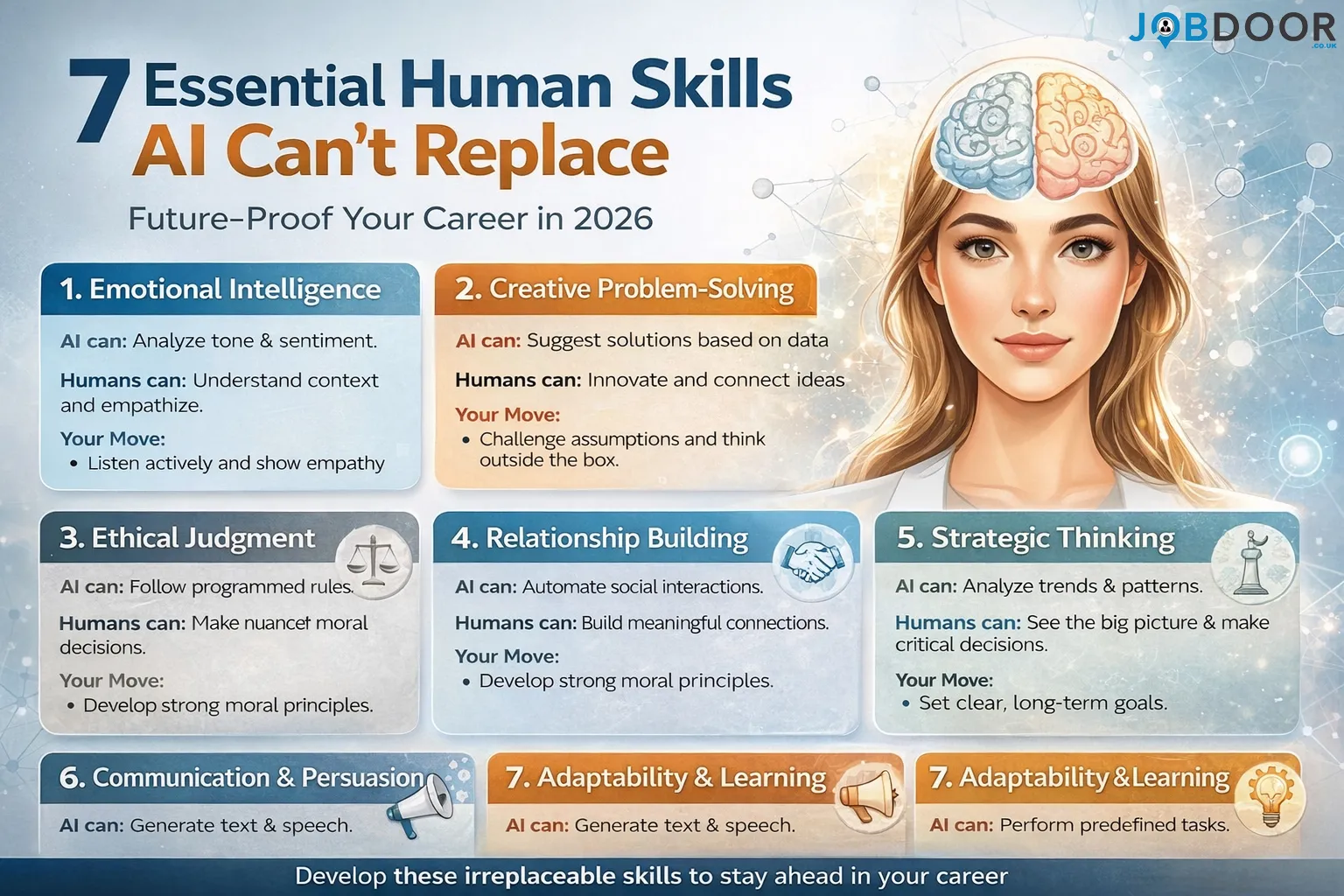
Artificial Intelligence is transforming how work is done. Automation, machine learning, and AI tools now handle tasks that once required large teams and years of experience. While this progress brings efficiency, it also raises a serious question for professionals across industries:
Which skills will still matter when AI becomes more powerful?
The answer is reassuring. Despite rapid technological advances, there are core human skills that AI cannot replace. These skills are not trends—they are timeless qualities that have always defined capable professionals. In 2026 and beyond, these abilities will become even more valuable.
This article breaks down 7 essential skills AI can’t replace, explains why they matter, and shows how you can strengthen them to stay relevant and respected in your career.
Why Human Skills Still Matter in the Age of AI?
AI excels at processing data, identifying patterns, and automating routine work. However, it lacks consciousness, values, lived experience, and moral responsibility. Businesses don’t just run on systems—they run on trust, judgment, relationships, and leadership.
Those who combine AI tools with strong human skills will not be replaced; they will be promoted.
1. Emotional Intelligence:
Emotional intelligence is the ability to understand emotions—both your own and others’—and respond thoughtfully.
What AI can do?
Analyze tone, sentiment, and behavioral data.
What only humans can do?
Show empathy, read context, build trust, and handle sensitive situations with care.
In leadership, customer service, negotiations, and teamwork, emotional intelligence is irreplaceable. People want to work with those who listen, understand, and respond with sincerity.
How to strengthen it?
- Practice active listening
- Improve self-awareness
- Learn to manage emotions under pressure
2. Creative Problem-Solving:
AI can generate ideas based on existing data, but true creativity comes from human insight.
What AI can do?
Suggest solutions based on patterns and probabilities.
What only humans can do?
Think outside the box, challenge assumptions, and connect unrelated ideas in meaningful ways.
Complex problems often require imagination, intuition, and experience—qualities shaped by human life, not algorithms.
How to strengthen it?
- Work on open-ended problems
- Learn across disciplines
- Question “standard” solutions
3. Ethical Judgment:
Ethics cannot be automated.
What AI can do?
Follow programmed rules and guidelines.
What only humans can do?
Make moral decisions, weigh consequences, and act with integrity in uncertain situations.
In areas like business leadership, law, healthcare, and governance, ethical judgment defines credibility. AI lacks accountability; humans do not.
How to strengthen it?
- Study real-world case studies
- Understand long-term consequences
- Commit to principles, not convenience
4. Relationship Building:
Strong relationships are built on trust, consistency, and mutual respect.
What AI can do?
Track connections and suggest networking opportunities.
What only humans can do?
Build genuine bonds, earn loyalty, and maintain long-term professional relationships.
Careers grow through people—not systems. Mentorships, partnerships, and client relationships are deeply human.
How to strengthen it?
- Communicate honestly and clearly
- Follow up consistently
- Add value before asking for favors
5. Strategic Thinking:
Strategy involves foresight, experience, and judgment.
What AI can do?
Analyze trends and optimize based on data.
What only humans can do?
Set vision, define priorities, and make trade-offs in uncertain environments.
Strategic thinking is not about reacting to data—it’s about deciding where to go and why.
How to strengthen it?
- Think long-term, not just short-term
- Study business and history
- Practice decision-making with incomplete information
6. Communication and Persuasion:
Clear communication remains one of the most powerful professional skills.
What AI can do?
Generate text, summaries, and scripts.
What only humans can do?
Persuade, inspire, negotiate, and communicate with authenticity.
Whether leading a team, pitching an idea, or resolving conflict, human communication builds understanding and alignment.
How to strengthen it?
- Improve writing and speaking clarity
- Practice explaining complex ideas simply
- Learn negotiation fundamentals
7. Adaptability and Learning Mindset:
The ability to adapt is the ultimate future-proof skill.
What AI can do?
Execute tasks it was trained for.
What only humans can do?
Learn continuously, adapt to change, and redefine roles as industries evolve.
Those who resist change are replaced. Those who adapt lead.
How to strengthen it?
- Stay curious
- Learn new tools without fear
- Accept change as part of growth
How to Combine AI with Human Skills?
The goal is not to compete with AI, but to work alongside it.
Use AI to:
- Automate repetitive tasks
- Improve efficiency
- Support analysis and research
Use human skills to:
- Make decisions
- Lead people
- Build trust and vision
This combination creates professionals who are both efficient and indispensable.
Common Career Mistakes to Avoid in 2026:
- Relying only on technical tools
- Ignoring people skills
- Avoiding responsibility and judgment
- Treating AI as a replacement instead of an assistant
Technology changes fast. Human values do not.
Final Thoughts:
Every major technological shift in history has rewarded those who preserved core human strengths while adopting new tools. The AI era is no different.
The 7 skills AI can’t replace—emotional intelligence, creativity, ethics, relationships, strategy, communication, and adaptability—have always mattered. In 2026, they matter even more.
If you invest in these abilities while using AI wisely, you won’t just survive the future of work—you’ll shape it.
-

 Career2 years ago
Career2 years agoCareer Opportunities for Seniors: 7 Jobs that are Perfect for Older Adults
-

 Money1 month ago
Money1 month ago26 Lucrative Passive Income Ideas to Build Wealth in 2026
-

 Job Description2 years ago
Job Description2 years agoGraphic Designer Job Description: Education, Salary, Skills, Work Hours
-

 News2 years ago
News2 years agoStudents’ question to UK PM Rishi Sunak: “What if your kids started smoking?
-

 Career2 years ago
Career2 years ago13 Best Jobs That AI Can’t Replace: A Guide to Future-proof Careers
-
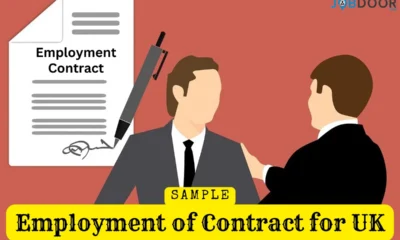
 Career2 years ago
Career2 years agoStandard Employment Contract Template Example for UK (Word & PDF)
-

 AI & Tools1 month ago
AI & Tools1 month agoChatGPT vs Copilot: Which AI Is Best for You in 2026?
-

 Money2 years ago
Money2 years agoHow To Get Paid to Read Books? (9 Best & Legit Sites)

